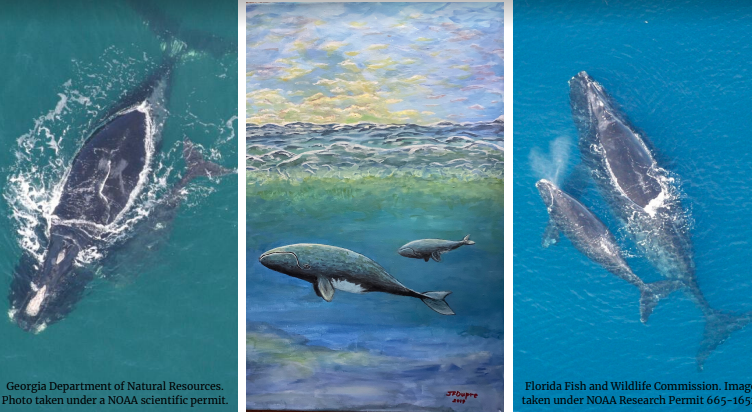There’s been several events and promotions this year that advocate and fundraise for critically endangered North Atlantic right whales, but possibly none yet as creative and artistic as the Right Whale Road Show. The road show brings local artists, environmentalists, and advocates together to raise awareness to the public on the crisis right whales are going through. We got a chance to chat with one of the founders of the show, Michaela Morris, on what it’s all about, as well as some insight into her job and the future of right whales. Don’t miss out on the next road show taking place on April 9th, as a webinar from 6-7pm. Click here to sign up!
1. What goes on at the Right Whale Road Show and what is its purpose?!
Right whales are amazing animals, and they live right off our New England coast! But tragically, there are only 400 right whales left. Without strong measures to reduce entanglements and vessel strikes — two of the leading causes of death — the species could go extinct. The goal of the right whale road show is to educate the public about the status of right whales and encourage people to act to protect them.
We’ve had two shows: one in Portland, ME and one in Newburyport, MA. There, the audience was able to check out artwork, listen to right whale experts share stories about whales, and take actions to protect right whales.
2. What is currently your work title and what do you do?!
I am an Oceans Fellow for Environment America. I’m based in Boston, and I work on two main campaigns: Save Right Whales and Wildlife over Waste, which is a campaign to reduce single-use plastic use. My day-to-day looks different every week. Some days, I lobby elected officials to pass bans on foam cups and takeout containers. Other days, I research and write reports. Other days, I plan public education events. It’s a lot of fun and varied work!
3. What made you want to be a part of the road show?
I love art, and I love right whales — but I also knew that many people had never heard of the species. I thought art would be a great way to quite literally bring visibility to the issue. I started to do some research, and I discovered that Bow Seat and Conservation Law Foundation ran a right whale art competition last year. So we partnered with them, and the rest is history!
4. Have you seen some changes arise because of the show?
Because of the show, I think more people know about and understand the problems that right whales face. It’s been a great way to connect with others who care about right whales. In the future, when there are opportunities to protect right whales — like when a bill is introduced in Congress, or our government publishes a rule to protect right whales — we can connect with these individuals and work with them to keep right whales safe and healthy.
One of the coolest parts of the show is the media coverage that we’ve received. News Center Maine featured our Portland show, and we’ve been written up in the Newburyport News and Wicked Local Gloucester. Because of this media coverage, we were able to reach people about the issue who couldn’t attend the show.
5. Why are right whales so important for our oceans?!
Right whales are beautiful animals. Each spring, many North Atlantic right whales migrate up the east coast, swimming all the way from calving grounds off Florida, Georgia, and South Carolina to the Gulf of Maine. They socialize in groups at the water’s surface, and mother whales — who form strong attachments with their calves — use soft, whispering tones with their young. These amazing animals bring so much beauty to our oceans, so we should work to protect them! Additionally, biodiversity is critical to maintaining healthy marine ecosystems, and the extinction of right whales would contribute to a loss of biodiversity.
6. What’s one of the easiest things in your opinion, that the average person can do to help right whales?
There are three major things that the average person can do to help the right whale.
(1) Write to your elected official (or call or email) and ask them to support the SAVE Right Whales Act. The bill protects right whales by devoting $5 million each year for ten years to the development of ropeless fishing gear. Many right whale deaths are caused by fishing entanglements, and the development of ropeless fishing technology would significantly decrease the risk of entanglements.
(2) You can help write a rule to protect right whales! The National Oceanic and Atmospheric Association (NOAA) is in the process of developing a rule to protect right whales. The draft rule should come out over the summer. Once NOAA publishes the rule, you can write your own comment on suggestions you have to make the rule stronger.
(3) You can also help educate others! Post on social media about right whales, organize an education event about right whales at your local library or school, and talk to your friends and family about these amazing animals.
7. One environmental message you want to send to the world!
We can all make a difference! Think about what aspects of the outdoors that you love. Maybe it’s the ocean, maybe it’s the mountains, or maybe it’s a lake. Then keep your eyes open for opportunities to help keep these special places healthy, like attending a clean-up, or testifying at a public hearing, or writing a comment. Anything you can give helps the movement!
Take Action
If you’d like to help right whales, click HERE to take action and write to your elected officials through Environment New Hampshire!
Or click HERE to take action through our Year of the Right Whale Project!
Together we can help save right whales!






